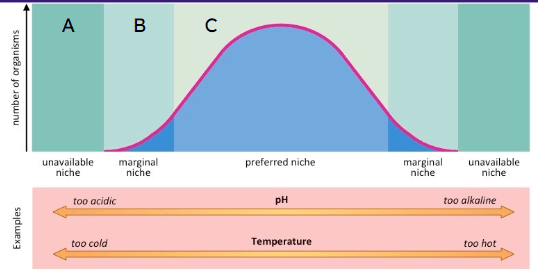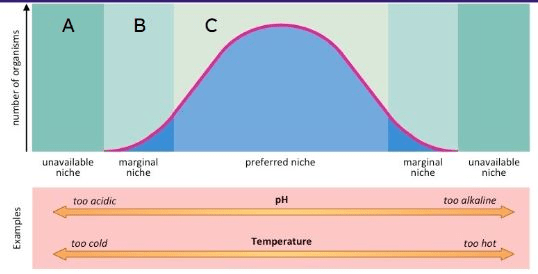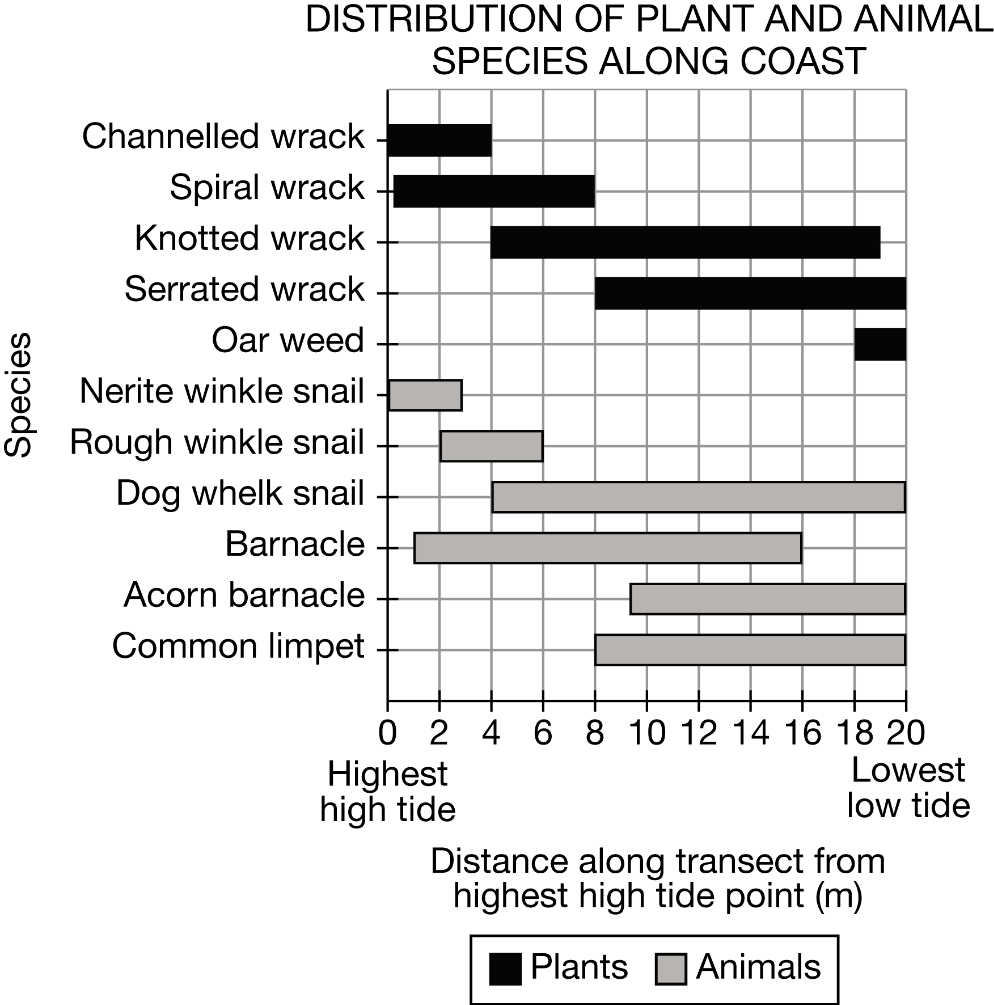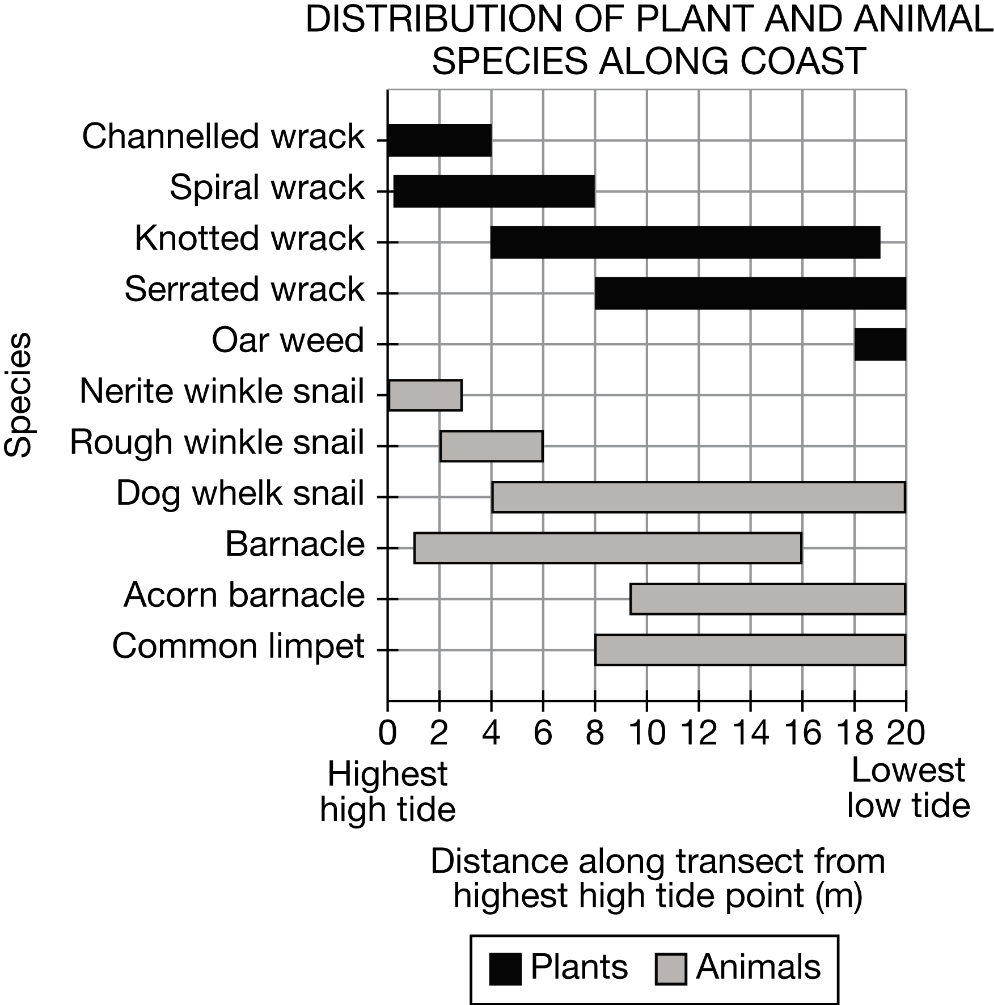This type of diversity explains that ecosystems that have a larger number of species are more likely to recover from disruptions.
What is species diversity?
Something that is produced by an ecosystem and can be used by humans.
What is a provisioning service?
Islands that are large and this tend to have the most migration from the mainland.
What is close?
The peak conditions that a species can exist in.
What are the optimum conditions?
The term for human-caused disturbances.
What are anthropogenic?
An organisms combination of alleles, such as Bb, bb, or BB.
What is a genotype?
A defining characteristic of primary succession, the environment does not have any of this.
What is soil?
The type of succession that occurs when soil is already in place.
What is secondary succession?
The community that is more diverse.

What is community 1?
Services of particular personal value to humans
What are culutural services?
Islands that are this and far from the mainland tend to have the least biodiversity.
What is far?
This is an intolerant zone.

What is Zone A?
The number of global mass extinction events that have occurred in the past as a result of changes to the environment.
What is five?
The physical characteristics of an organism.
What is a phenotype?
The first species to move into an area that is unoccupied.
What are pioneer species?
Organisms that have a disproportionately large effect on its environment relative to its abundance
What are keystone species?
The number of different species in a specific area, such as a landscape, ecological community, or region
What is species richness?
Ecotourism
What is a cultural service?
This graph represents this island biogeography concept.
What is the island equilibrium model?
This zone is known for physiological stress.

What is Zone B?
Disturbances that occur at repeated intervals
What are periodic?
A change to an organisms DNA that may result in a new variant, or allele.
What is a mutation?
The point where biodiversity is highest for that habitat.
What is a climax community?
Disturbances such as Coal mining, Invasive species, Rapid climate change, and Habitat fragmentation
What are anthropogenic or human disturbances?
This type of diversity allows a particular species to have a good chance of surviving a natural disruption IF the diversity is high.
What is genetic diversity?
Trees provide shade/lower local temperatures.
What is a regulating service?
Organisms that exist only on a specific island.
What are endemic species.
An organism that can signal changes in its environment, and can be used to help assess the health of an ecosystem
What is an indicator species?
Disturbances occurring occasionally and at irregular intervals
What are episodic?
A mechanism of gene diversity where humans select for and breed organisms to express particular traits.
What is artificial selection?
A non-vascular plant that contributes to organic matter in the formation of soil when it dies/decomposes.
What is moss?
Those that have a strong role in structuring a community
What are foundational species?
When a habitat is vulnerable to collapse, this type of species is usually the first to be lost, due to their niche habitats and feeding preferences.
What are specialists?
Renewable commodities.
What are provisioning services?
The outcome when species run out of resources.
What is extinction?
Conditions such as temperature, pH, salinity, etc. that determine an organisms tolerance range.
What are abiotic factors?
This is the largest cause of tree-cover loss in Africa.
What is agriculture?
A mechanism of gene diversity that results from pieces of DNA beingbroken and then rejoined, creating new combinations of alleles.
What is recombination?
A symbiotic fungi and algae that typically is a first colonizer of bare rocks.
What is lichen?
The term for the changes that occur in a community or population at the boundary of a habitat
What is the edge effect?
This is a dramatic reduction in the size of a population, often caused by a catastrophic event like a natural disaster, disease outbreak, or human activity, which leads to a significant decrease in genetic diversity within that population as only a small number of individuals survive to reproduce, passing on a limited gene pool to future generations.
What is a population bottleneck?
Habitats
Photosynthesis
Nutrient cycling
Soil formation
Water cycle
Genetic diversity
What are supporting services?
The concept that explains why Darwin's finches all evolved different beak sizes/shapes to fulfill different niches on the Galapagos Islands.
What is adaptive radiation?
**Wrack is a type of seaweed.
This species has the lowest range of tolerance.

What is oar weed?
A measure of how much an ecosystem changes after a disruption
What is resistance?
The type of evolution that brings about new variations of alleles, or changes to allele frequencies in the gene pool but does not lead to speciation.
What is microevolution?
Low shrubs and trees that require a lot of sunlight.
What are intermediate or mid-successional species?
Rare disturbances favor this kind of species.
Competitive?
The collection of all genes, including different variations (alleles), present within a specific breeding population of a species at a given time; if this is low, a species is vulnerable to collapse.
What is a gene pool?
Mangroves mitigate storm damages along coastlines.
What are regulating services?
Types of organisms that make really good invasive species (bad for the island species).
What are generalists?
Assuming the animals ate the plants in this graph, this species would likely go extinct if channelled and spiral wrack (types of seaweed) disappeared.
What is the nerite winkle snail?
A measure of how quickly the ecosystem can “bounce back” from the disturbance.
What is resilience?
The type of evolution that results in speciation.
What is macroevolution?
Due to an increase in this over a long period of time, aquatic systems, such as lakes, tend to fill in their water body as succession progresses.
What is sedimentation?
Frequent, short-lived disturbances favor these type of species.
Fast-growing (r-selected).